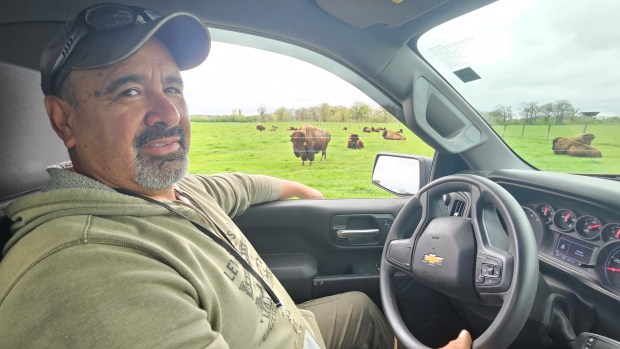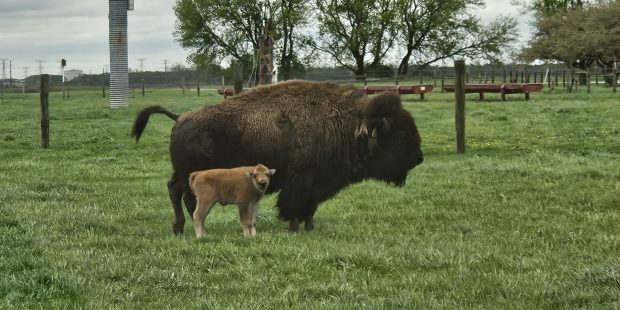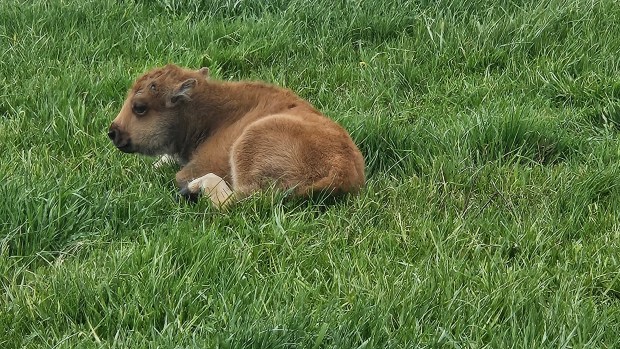The first baby bison of the year was born last Friday to the herd at Fermilab in Batavia, one of the Aurora area’s sure signs of spring, officials said.
As many as 20 bison calves are expected to be born this spring at Fermilab. The bison herd dates back to the lab’s first director, Robert Wilson, who elected in 1969 to turn part of Fermilab’s property into a sanctuary farm.
Tracy Marc, media relations manager for Fermilab, said April is always the month where animal caretakers on the grounds “start looking for births” and that the annual cycle continues to reflect the vision of Wilson “who was creating a frontier of science at Fermilab and, in doing so, also wanted the surrounding area to be the frontier of what the prairie lands looked like before the lab was there.”
“He was the one who instituted the program and he also wanted to connect with the community,” Marc said of Wilson. “By doing so – by having an open campus where people can come and visit the bison and enjoy the ecology – that was the whole reason behind making this accessible to the public. This was so people can understand and appreciate the land and the science that is performed at Fermilab.”
Marc added the bison program “is very natural and there is very little interaction with the animals, other than just maintaining their well-being.”
“We usually get about a couple hundred visitors in the springtime. There such an influx because we don’t track where people are going,” Marc said. “We also have offered the online bison camera now which is a good way for people to connect with the animals for people who don’t live anywhere in the area.”
The camera can be accessed at https://www.fnal.gov/pub/about/bisoncam/
Fermilab Roads and Grounds Manager Will Alvarez, 38, of Batavia, said he has worked full-time at the facility for 13 years has seen many bison births.
Having animals “adds something great to the surrounding area” every year, he said on Monday, and that the births of bison calves “are a first sign of spring.”
“This shows us each year that spring is actually here. You can count on having some of the calves every year but the dates do range for when they come,” Alvarez said. “That’s part of the anticipation. At the beginning of April, everyone starts asking myself or our head herdsman, they’ll start asking, ‘Any babies yet? Any babies yet?’”
Alvarez said as calves are born, they are kept for a few months and then “in October, they go through their vaccination process.”
“We have a vet come on site and they get vaccinated and the majority are sold then throughout the Midwest to other small herds,” he said. “They are sold at a silent auction every October and most of them are bought for breeding herds throughout the Midwest. We have people from Indiana, Michigan and southern Illinois that come out and they purchase the bison for their herds.”
The current herd remains consistent with about two dozen animals.
Last Friday, two calves were born from “two different moms,” Alvarez said, with a third born on Saturday.
“There are more on the way but they’re usually born in April, May and June,” he said.
Head herdsman Cleo Garcia, 62, also of Batavia, who in addition serves as the roads and grounds crew chief, said he has worked at the facility almost 23 years and has seen his share of calves born.

“I’ve seen many of these animals born. After all these years I think it’s nice to see a new life come into the world and see a lot of people come and check on them this time of year,” he said. “This was the vision of the first director to make a frontier of physics and the frontier where bison used to run.”
Garcia said he gets plenty of questions from visitors who come to see the bison at Fermilab.

“They want to know if we name the calves. We don’t because we auction them at the end of the season and don’t want to get too personal with them,” he said. “They also want to know how many we’re going to have. We average about 20 a year.”
Garcia said the animals “are pretty self-sufficient this time of year but in the wintertime, we have to supplement them with grain and hay.”
David Sharos is a freelance reporter for The Beacon-News.




